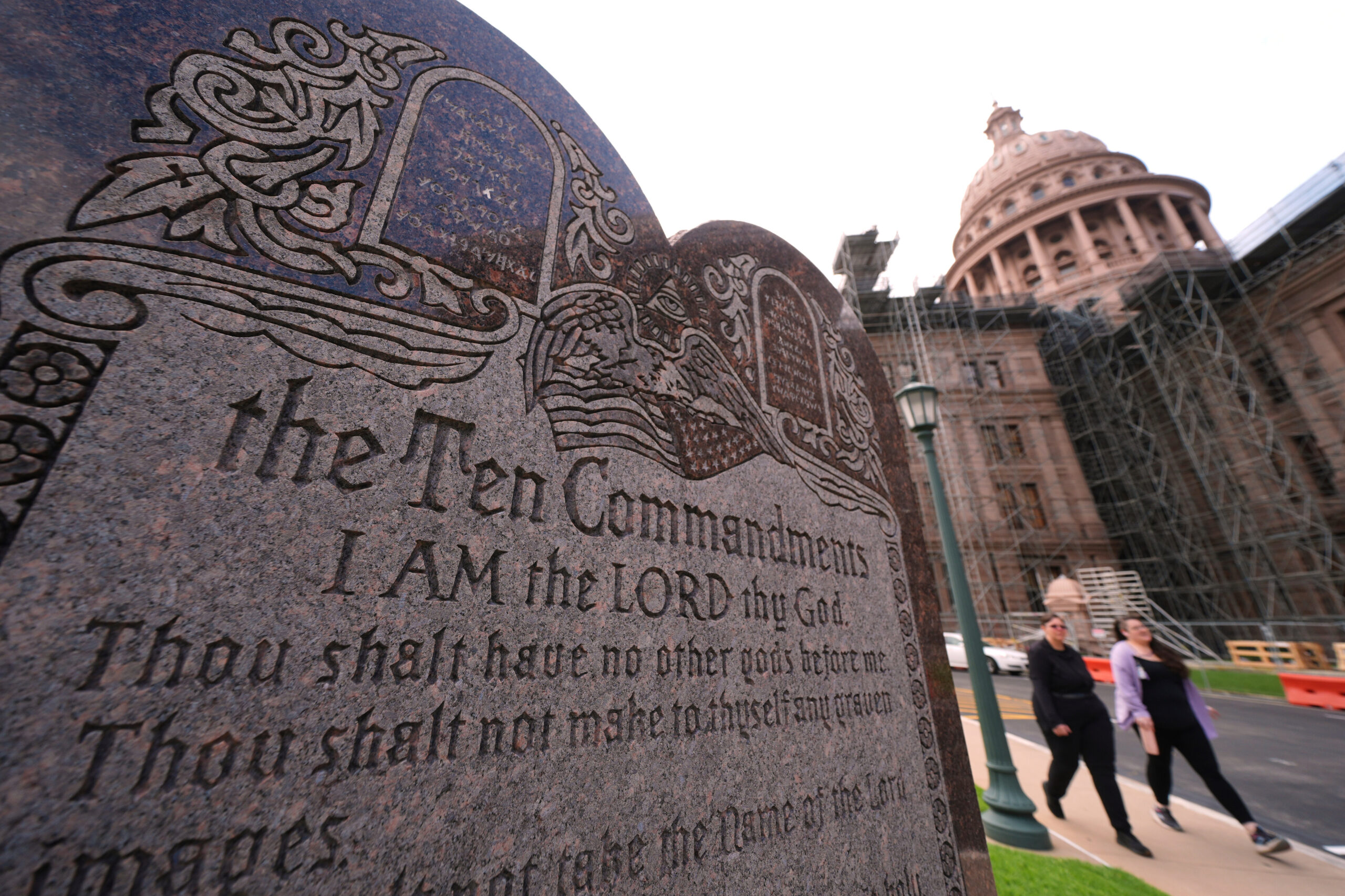
(RNS) — Judicial opinions are usually dry recitations of the facts and the law, soberly working their way toward a judgment that at least gives the appearance of being solidly based. But every now and then along comes a piece of solid jurisprudence that is worth the price of admission as sheer entertainment.
To wit: the preliminary injunction issued Wednesday (Aug. 20) by U.S. District Judge Fred Biery forbidding several Texas school districts to comply with the new state law requiring the Ten Commandments to be posted in all public school classrooms.
First, the solid jurisprudence. The U.S. Supreme Court has long since disallowed the posting of the Ten Commandments in public schools, ruling in Stone v. Graham (1980) that a state (in that case, Kentucky) cannot use a claim of educational purpose to hide religious purpose. Upholding Stone, the 5th U.S. Circuit Court of Appeals, which has jurisdiction over the Texas courts, ruled in June that a Louisiana Ten Commandments law virtually identical to Texas’ is unconstitutional.
In short, for Texas Attorney General Ken Paxton to call Biery’s decision “flawed,” as he did yesterday, was nonsense. Precedent demanded it and no federal judge in their right mind would do otherwise unless and until the U.S. Supreme Court reverses Stone (which, of course, it could).
Now for the entertainment.
Let us note that Biery, who was appointed by President Bill Clinton back in 1994, is a droll character who gained international notoriety a dozen years ago when he refused to issue a preliminary injunction in what he styled The Case of the Itsy Bitsy Teeny Weeny Bikini Top v. The (More) Itsy Bitsy Teeny Weeny Pastie.”
His ruling began, “An ordinance dealing with semi-nude dancers has once again fallen on the Court’s lap.” It ended thusly: “Should the parties choose to string this case out to trial on the merits, the Court encourages reasonable discovery intercourse as they navigate the peaks and valleys of litigation, perhaps to reach a happy ending.”
But I digress. What follows are just a few highlights from this week’s Biery ruling, offered in hopes that you will read the 55-page document yourselves.
It begins with an overview of the world’s religious diversity, as in: “Not wanting their existence to end, Homo sapiens developed a multitude of theories and hopes, encompassed in thousands of religions, of how they can avoid returning to the Earth from whence they and other species came. Or, as the country western song says: ‘Everybody wanna go to heaven, but nobody wanna go now.’”
He refers to the good that religions do, but then there’s the bad: “While religious institutions bestow many blessings and try to alleviate suffering, those acts of Grace are neutralized by religious Homo sapiens who exhibit an historical and continuing pernicious and pervasive tendency to kill other humans and confiscate the property of those, sometimes even within the same religion, who do not believe as they do.” Examples follow.
With respect to the Judeo-Christian deity who, says the Bible, issued the Decalogue, Biery borrows from an account in the Quran: “Even poor old Abraham was shunned by his own family for believing in one God and rejecting the multiple gods of his fathers. His descendants, the cousins Moses, Jesus and Mohammed, would be perplexed by the blood spilled by their followers against each other. ‘Jesus wept.’ See John 11:35. That violent history gives rise to the question: ‘Haven’t we evolved?’ Other than size and longevity, the answer clearly is: ‘Of course not.’ ‘The Beat Goes On.'”
The judge takes a moment to thank the constitutional scholars called by each side to give expert testimony, describing it as “an extensive augmentation of the Court’s 20 years of Methodist Sunday School and theology, political philosophy and constitutional history courses at Texas Lutheran University.”
He issues a warning based on the observation that students might actually read the posted text:
Even though the Ten Commandments would not be affirmatively taught, the captive audience of students likely would have questions, which teachers would feel compelled to answer. That is what they do. Teenage boys, being the curious hormonally driven creatures they are, might ask: “Mrs. Walker, I know about lying and I love my parents, but how do I do adultery?” Truly an awkward moment for overworked and underpaid educators, who already have to deal with sex education issues … and a classic example of the law of unintended consequences in legislative edicts.
Biery wraps up by suggesting that “to avoid religious rancor and legal wrangling the Texas Legislature alternatively could require the posting of:
1. Multiple versions of lessons of behavior from many cultures melded into the American
motto of ‘E pluribus unum,’ a concept currently in decline. For example, the Five
Moral Precepts of Buddhism: abstain from killing, stealing, engaging in sexual
misconduct, lying and intoxicants;2. Do unto others as you would have them do unto you. Be kind. Be respectful.;
or
3. All I Really Need to Know I Learned in Kindergarten: ‘Share everything. Play Fair.
Don’t hit people. … Clean up your own mess. Don’t take things that aren’t yours. Say
you’re sorry when you hurt somebody. … Live a balanced life. … When you go out
into the world, … hold hands, and stick together.’”
To which I would add the suggestion that the Legislature make the ruling itself part of the state’s social studies curriculum. Come to think of it, Biery’s final words might usefully be posted not only in classrooms but also in government buildings and courthouses around the state:
“For those who disagree with the Court’s decision and who would do so with threats, vulgarities and violence, Grace and Peace unto you. May humankind of all faiths, beliefs and non-beliefs be reconciled one to another.
“Amen.”
